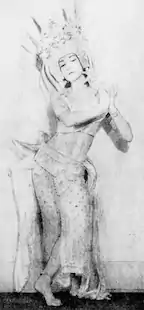Xenia Zarina
Xenia Zarina (1903 – August 15, 1967), born June Zimmerman, was an American dancer.
Xenia Zarina | |
|---|---|
 Xenia Zarina, from a 1930 newspaper. | |
| Born | June Zimmerman 1903 |
| Died | August 15, 1967 Mexico City |
| Occupation(s) | Dancer, dance scholar, dance educator |
| Notable work | Classic Dances of the Orient (1967) |
Early life
June Zimmerman was the daughter of Oliver Brunner Zimmerman and Grace Adele Bushnell Zimmerman. Contrary to some accounts of her early life,[1] both of her parents were born in the American Midwest. Her father was a military engineer during World War I,[2] who taught at the University of Wisconsin[3][4] and the University of California,[5] and wrote a manual for tractor engine maintenance.[6] She graduated from Lyons Township High School in Illinois, and studied dance with Michel Fokine and other Russian dancers.[7][8]
Career
Zarina danced with the Chicago Opera Civic Ballet as a young woman,[9][10] and gave dance recitals for community groups in the midwest.[11][12] She appeared as a dancer in films Morning Judge (1926) and Chucho el Roto (1934). In 1935, she made her New York debut at the Guild Theatre, in a program of regional Mexican and "interpretive" dances with elaborate costumes.[13]
She traveled in Mexico[14] and many Asian countries[15][16] during the 1930s and 1940s, studying, performing, and teaching traditional dances.[9][17] She studied with Matsumoto Kōshirō VII in Japan.[18] For a time, when her travels were restricted during World War II,[7] she taught dance to the daughter of the Shah of Iran.[19][20] While in Iran, she worked with a fellow American expatriate, Nilla Cram Cook, who held a high position in Iran's Ministry of Education.[21]
An illustration depicting Zarina by Magda Nachman[22] was published in Dance Magazine in 1952.[1] She was on the program at Jacob's Pillow Dance Festival in 1955.[23][24] She wrote a book, Classic Dances of the Orient (1967),[25] with "particularly extensive treatments of the Indian Bhurat Natyam and the Japanese Nihan Buyo."[26]
Personal life
Zarina died in 1967, in her sixties, in Mexico City. Her brother Gordon Zimmerman wrote about her life for an Illinois newspaper after her death.[7]
References
- Bernstein, Lina (2020-06-23). Magda Nachman: An Artist in Exile. Academic Studies PRess. ISBN 978-1-61811-970-4.
- "Liberty Fuel is O. K." Republic County Democrat. 1919-01-15. p. 6. Retrieved 2020-09-08 – via Newspapers.com.
- "Former Instructor at Madison Succumbs". The Journal Times. 1941-05-13. p. 15. Retrieved 2020-09-08 – via Newspapers.com.
- "Oliver B. Zimmerman". Wisconsin State Journal. 1941-05-14. p. 2. Retrieved 2020-09-08 – via Newspapers.com.
- "J. Zimmerman, Local Inventor, Dies in South". The Capital Times. 1939-04-21. p. 6. Retrieved 2020-09-08 – via Newspapers.com.
- Zimmerman, Oliver Brunner (1920). Internal Combustion Engines and Tractors, Their Development, Design, Construction, Function and Maintenance. International Harvester.
- "Brother of Xenia Zarina Writes About Her Life". Brookfield Citizen. October 19, 1967. p. 25. Retrieved September 8, 2020 – via NewspaperArchive.com.
- "Chenkin and Zarina at Orchestra Hall". Chicago Sentinel. October 9, 1931. Retrieved September 8, 2020 – via NewspaperArchive.com.
- Isaac Cohen, Matthew (March 2007). "DANCING THE SUBJECT OF 'JAVA' : International Modernism and Traditional Performance, 1899–1952". Indonesia and the Malay World. 35 (101): 9–29. doi:10.1080/13639810701233722. ISSN 1363-9811. S2CID 214652986.
- "Opera Ballet Finds Rest Here After Long Tour". Star Tribune. 1930-03-23. p. 8. Retrieved 2020-09-08 – via Newspapers.com.
- "Oriental Dancing of Xenia Zarina Pleases Watchers". Wausau Daily Herald. 1931-01-26. p. 4. Retrieved 2020-09-08 – via Newspapers.com.
- "Dances of Mexico Shown by Artists in Studio Recital". Wausau Daily Herald. 1932-04-09. p. 4. Retrieved 2020-09-08 – via Newspapers.com.
- Martin, John (1935-01-21). "XENIA ZARINA DANCES IN NEW YORK DEBUT; Interesting Mexican Numbers, Excellently Costumed, Are Features of Program". The New York Times. ISSN 0362-4331. Retrieved 2020-09-08.
- "Guest Dancer Sees Hope for America". Wausau Daily Herald. 1932-04-07. p. 4. Retrieved 2020-09-08 – via Newspapers.com.
- "Dansavond Xenia Zarina". Soerabaijasch Handelsblad. August 9, 1938. Retrieved September 8, 2020 – via NewspaperArchive.com.
- "Xenia Zarina". De Sumatra Post. April 22, 1938. Retrieved September 8, 2020 – via NewspaperArchive.com.
- "Gains Permission". The San Bernardino County Sun. 1935-01-19. p. 5. Retrieved 2020-09-08.
- "Xenia Zarina Recital Tonight". Tribune (Philippines : 1932 - 1945). 1937-07-30. p. 5. Retrieved 2020-09-09 – via Trove.
- "Ruth St. Denis, 75, Returns to Pillow". The Berkshire Eagle. 1955-08-20. p. 29. Retrieved 2020-09-08 – via Newspapers.com.
- "Visiting Dancer Recalls Some Oriental Footwork". Star Tribune. 1958-07-10. p. 8. Retrieved 2020-09-08 – via Newspapers.com.
- "UNESCO May Miss Its Dancing Girls". The Sydney Morning Herald. 1948-08-04. p. 3. Retrieved 2020-09-18 – via Newspapers.com.
- "Xenia Zarina (1947)". Magda Nachman Acharya. 2018-09-10. Retrieved 2020-09-09.
- "Person : Xenia Zarina". Jacobs Pillow Archive. Retrieved 2020-09-08.
- Parker, T. H. (1955-06-12). "Danes en Arabesque". Hartford Courant. p. 27. Retrieved 2020-09-08 – via Newspapers.com.
- Zarina, Xenia (1967). Classic Dances of the Orient. Crown Publishers.
- "Classic Dances of the Orient (review)". Kirkus Reviews. Retrieved 2020-09-08.
External links
- Xenia Zarina at IMDb
- Xenia Zarina at British Film Institute
- Photographs of Xenia Zarina in various dance poses and costumes, at Mediateca IMAH.